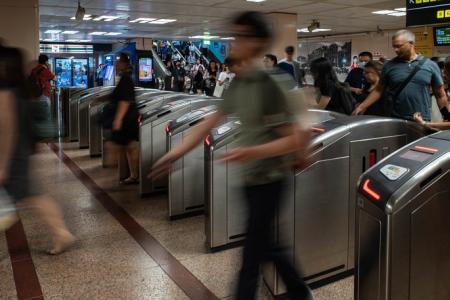Why do Singaporeans love to complain?
If Singapore has a national pastime beyond lining up for food and scoring deals, it is complaining.
Few places reflect this national penchant for airing daily grievances more than the popular Facebook group COMPLAINT Singapore, which has accumulated more than 230,000 members since it started in 2017.
One user’s post on Dec 8, which drew over 400 “likes”, has a picture of the “worst carrot cake I ever ate in my life”.
Others chime in, commiserating: “I’ve never seen carrot cake look like this before.”
Banal complaints about trivialities such as small portions of hawker food, rude private-hire drivers and misleading advertising are common on the platform, though it is not reserved for just minor irritants.
A small fraction of posts are of grievances like insurance providers denying a claim, disputes between neighbours and negative interactions with businesses.
The group’s anonymous moderators tell The Straits Times that the Facebook page was launched “as several founding members found that there is almost no online platform for complainants or victims to voice their genuine complaints in Singapore”.
Today, the group receives 30 to 100 submissions daily, though the majority are rejected by moderators for failing to meet basic requirements, such as providing evidence or avoiding hateful speech. Its 10 or so volunteers take turns to moderate the comments in shifts.
Still, the group set up as an outlet for venting has itself been divisive, even among its users.
Commercial manager Alaric Ng, 33, says he is no fan of the Facebook group, decrying its users as “posting rubbish and whining about everything on earth” without a filter and referring to those who post complaints that are overtly hateful and xenophobic.
Meanwhile, photographer Ken Chiang, 29, says: “I think complaint culture is sometimes necessary only if it’s really warranted. And these groups at times do effectively get the message across to the relevant parties.
“However, many of the users in such groups abuse the platform and treat it as their own personal ranting space for issues that are overly trivial and sometimes infringe on the privacy of others.”

Rising appetite for grumbling
Online chatter comprises only a small chunk of Singaporeans’ many daily complaints.
According to the Ministry of National Development in 2023, Singapore residents make 1.7 million municipal complaints every year.
COMPLAINT Singapore is not the only online community where laments and protestations are its bread and butter.
A copycat group, Complaint Singapore – with “complaint” in lower case – was started in 2018 and has more than 230,000 members.
Another Facebook group, SG Road Vigilante, boasts over 270,000 members. Its posts consist primarily of netizens’ outrage over bad road behaviour, mainly by naming and shaming motorists through dashcam footage.
Even lifestyle-centric Instagram accounts like @sgfollowsall, which has nearly 200,000 followers, brim with complaints about the weather, unneighbourly behaviour and road manners.
While it might be easy to dismiss these groups as echo chambers of petty moaners, these groups have an outsized impact in shaping Singapore’s online discourse.
Many businesses – from insurance company Great Eastern to foodcourt operator Koufu – are active in Complaint Singapore, using their social media accounts to respond directly to customer complaints.
Posts in these groups are also regularly featured in news reporting.
In November alone, posts from across both of the Complaint Singapore Facebook groups were cited in 12 articles on Mothership.
In that same period, videos or posts from SG Road Vigilante were cited in nine articles in The Straits Times.
COMPLAINT Singapore’s moderators say they have also used the group’s public influence to do some good. They say the group partnered the Singapore Police Force in its crime prevention campaigns in 2022 and 2023 to spread awareness of online scams.

In defence of “whining”
Much like gossip, there is a social function to complaints.
Dr Jonathan Sim, a lecturer at the National University of Singapore’s department of philosophy, says that in its most basic form, a complaint is an expression that something is not right.
Such dissatisfaction can therefore serve as an impetus to right a wrong.
“Take traffic complaints, for example,” he says. “The complaints are a signal that there’s a rise in errant drivers on the road. When people complain, there’s a sense that they care. They may not be accurate in articulating the problem, but it’s a signal that they care about something that isn’t right.”
The Republic’s propensity for whining is a subject of fascination for Dr Sim, who says Singapore’s traditional Asian and Confucian culture, which emphasises shame as a regulating force, plays a role in the way people here behave on social media.
However, he also believes the country’s complaint culture can be a double-edged sword.
On the one hand, Singaporeans have a critical eye and high standards of service and quality, which can be a positive trait in the workplace and civic life.
On the other, voicing complaints indiscriminately over all manner of grievances – no matter how petty – can sometimes make it difficult for the targets of these complaints to discern legitimate problems from minor issues.
“In that sense, we’ve normalised a culture where people think it’s okay to bring petty grievances online. You lose your perspective. If you go to other countries and complain like that, they’ll go, ‘What gives?’ This is a very uniquely cultural thing,” he says.
In Singapore’s online complaint-focused communities, such perspective is often lost.
The most banal of complaints take on a networked and social dimension, with users finding solidarity in others who agree and add to their mostly negative assessments.
But, as Dr George Wong, a senior lecturer of sociology at Singapore Management University, puts it: “Online complaint culture can be a force for good when stakeholders and the public recognise how they can utilise the engagement to their purposes.”
When a critical mass of engagement and attention accumulates from a mass of similarly affronted users, a complaint cuts through the noise and demands attention from media organisations and the subjects themselves.
For instance, some users have successfully resolved botched orders after their complaints went viral online. In one 2019 case involving Lazada, a user received a refund and a call from the e-commerce company’s chief executive after a Facebook post about an order gone wrong garnered over 1,000 “likes”.
In another incident, a Complaint Singapore user who posted in 2021 about being overcharged by a plumbing company for a water heater was offered a $2,700 refund after her post drew the attention of the authorities.
According to Dr Natalie Pang, an associate professor at NUS who researches new media, the power of these groups lies in how they provide a way for users to express themselves freely, which they may be unable to do when reporting an incident to the authorities.
“In other words, such groups are popular not only because they are accessible, but also because they provide a platform for more free expression and a sense of community in some cases, even though many may be anonymous,” she says.
In that sense, these complaining communities are not uniquely Singaporean.
Dr Howard Lee, a lecturer at the school of media and communication at Murdoch University in Australia, notes that such networked communities exist anywhere there is an internet connection.
What may differ is the follow-through. In some societies, online outrage fuels large-scale social movements such as the #MeToo movement or Black Lives Matter. In Singapore, the chain reaction tends to remain online.
“This is not slacktivism,” says Dr Lee. “It is just an assumed condition of Singapore’s civic space.
“We should not forget that the idea of citizen journalism was facilitated by the internet, so it is really no surprise that viral content makes the news.”
As such, media articles citing groups such as Complaint Singapore and SG Road Vigilante use them not only as a source of stories and images, but also as a gauge of public opinion.
However, Dr Lee notes that these sites do not replace traditional journalism.
“While such online sources might provide a buffet of raw content, it is the job of journalists to filter, fact-check, verify, investigate or debunk such online content.”

Beyond 'minor irritants'
That is not to say there is no difference between good and bad complaints.
“We typically think anger is a bad thing,” says Dr Sim. “But there are some who know how to strategically use anger to get across a certain message. There is a certain mastery to it.”
For instance, groups can also be the source of intense and misplaced online vitriol, inciting witch hunts that can lead to death threats, lost jobs and other real-world ramifications, sometimes over misunderstandings or cases of mistaken identity.
In 2018, a misunderstanding at a Caltex petrol station went viral, with the driver claiming he had requested only $10 worth of petrol, while the attendant had filled his tank full.
More than 1,000 netizens joined a Facebook page aimed at teaching the driver “an evil lesson”, as he had refused to pay for the full tank of petrol.
His personal details – including phone number, workplace and family photos – were circulated online. Caltex later clarified that the attendant did not have to make up the difference in cost, and the driver lodged a police report over the harassment he faced.
Concern over such ramifications has led some groups to implement guardrails.
For example, COMPLAINT Singapore has turned complaining into something of an art form with its community rules, designed to filter out certain comments with insufficient information, and to create a more effective form of public shaming.
Its moderators say most of the submissions they receive run afoul of the group’s restrictions on hateful content or insufficient information.
For example, if a user pens a rant about an errant healthcare provider, his or her post will be rejected without further evidence – in the form of pictures or screenshots – to back up the claims. In this case, the filter, which requires putting in more effort and marshalling of evidence, lets cooler heads prevail.
But there is at least one small and important upside to complaining.
“If we set aside the most petty complaints, one of the things that I realise is that I would rather have people who complain rather than people who don’t, because people who complain show that they actually care,” says Dr Sim.
“On the other hand, the people who get so jaded and apathetic, they simply stop caring.”
Get The New Paper on your phone with the free TNP app. Download from the Apple App Store or Google Play Store now


